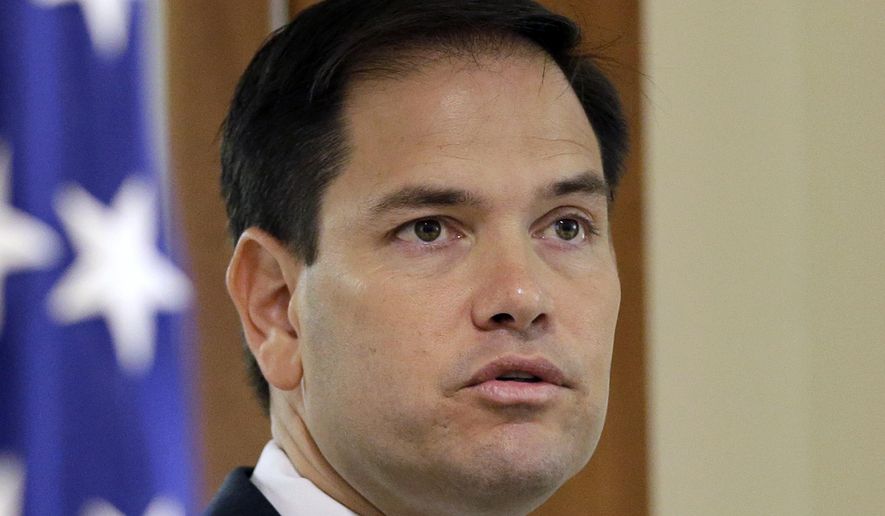Democrats have found some unexpected Republican allies in contesting WikiLeaks’ embarrassing revelations about Hillary Clinton because of Russia’s suspected involvement in the email hacks.
Sen. Marco Rubio, a Republican running for re-election in Florida, warned Wednesday against using the leaked emails as political ammunition against Mrs. Clinton, the Democratic presidential nominee.
“These leaks are an effort by a foreign government to interfere with our electoral process, and I will not indulge it,” he told ABC News. “Further, I want to warn my fellow Republicans who may want to capitalize politically on these leaks: Today, it is the Democrats. Tomorrow, it could be us.”
Republican presidential nominee Donald Trump has seized on the WikiLeaks dump of more than 21,000 emails intercepted from the Clinton campaign as evidence that she is a double-dealing, corrupt politician.
Mr. Rubio put some distance between himself and the embattled presidential nominee, but he hasn’t withdrawn support as other Republicans have done since the release of a 2005 videotape in which Mr. Trump makes lewd sexual remarks about women.
Mr. Rubio’s warning about Russia and WikiLeaks echoed the talking points used by Democrats, who have repeatedly deflected questions about the content of the email by charging that Russia is attempting to interfere in the presidential race to help Mr. Trump.
“The release of these e-mails is playing into the Russians’ hands,” Rep. Adam B. Schiff of California, the top Democrat on the House Permanent Select Committee on Intelligence, said on CNN.
As Mr. Rubio did, Mr. Schiff noted that the Obama administration has accused Russia of being behind the hacks that the supplied the emails to WikiLeaks.
“That represents really quite an unprecedented interference with our political affairs. That ought to be shunned by both parties,” he said.
Republican strategist Ford O’Connor credited Mr. Rubio, a member of the Senate Foreign Relations Committee and Select Committee on Intelligence, with positioning himself for the postelection political environment.
He said the threat of cyberattacks by Russia, China and others — as well as more WikiLeaks scandals — will not disappear.
“He’s trying to shepherd Republicans in the right direction because he knows what looks good today may not look good tomorrow,” said Mr. O’Connor. “Adam is also part of that sort of foreign policy crew, so he knows what is going on as well.”
Asked whether Mr. Schiff would be “singing the same tune” if the Republican candidate had been the target, Mr. O’Connor replied, “I highly doubt it.”
The emails, hacked from the account of Clinton campaign chairman John Podesta, are potentially damaging to Mrs. Clinton’s run:
• The emails include excerpts from paid speeches to Wall Street executives in which Mrs. Clinton talks about two positions — one for the public and one for insiders — on issues such as trade policy.
• Another shows Mrs. Clinton telling Brazilian bank executives that her dream is “a hemispheric common market, with open trade and open borders.”
• Top Clinton campaign officials disparage Catholics and evangelicals for their religious faith, and Mr. Podesta muses about inciting a “Catholic spring” to secularize the church.
• Mr. Podesta describes two prominent Democrats — former New Mexico Gov. Bill Richardson and former Transportation and Energy Secretary Federico Pena — as “needy Latinos.”
• He also calls Mrs. Clinton’s former primary rival Sen. Bernard Sanders, whose support Mrs. Clinton needs to energize young voters, a “doofus.”
The Clinton campaign has not authenticated the emails but also has not denied that they are genuine.
Mr. Podesta had an awkward exchange with CNN’s Wolf Blitzer on Wednesday when pressed about whether he called Mr. Sanders a “doofus.”
“Without confirming the accuracy of the email, I was frustrated with him,” Mr. Podesta said. “But he and I have a very good relationship and I have great affection for him.”
“I’ll take that as a yes,” said Mr. Blitzer.
• Seth McLaughlin can be reached at smclaughlin@washingtontimes.com.
• S.A. Miller can be reached at smiller@washingtontimes.com.




Please read our comment policy before commenting.